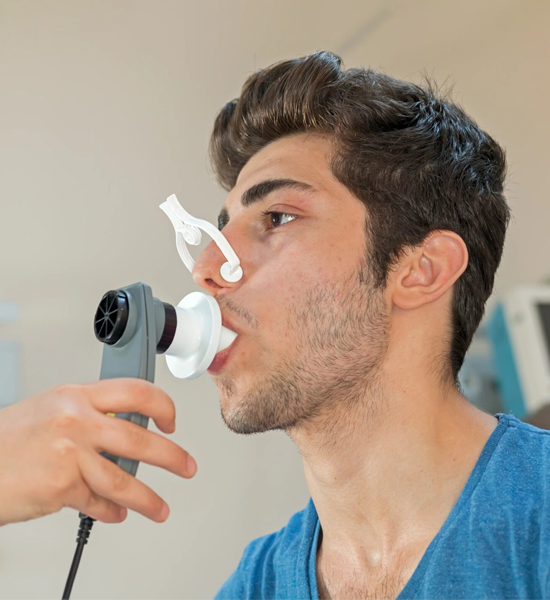Pulmonary Function Test (PFT) also known as a lung function test is a noninvasive procedure used to determine lung function. It measures specific health determinants to provide the physician with a detailed picture of the lung’s capabilities. The test then helps the healthcare provider prevent, diagnose, and manage any lung disorder.

Pulmonary Function Test
The pulmonary function test measures the following;
- Tidal volume: the amount of air inhaled or exhaled during normal breathing.
- Vital capacity: the total volume of air that can be exhaled after inhaling to the fullest.
- Functional residual capacity: amount of air left in lungs after exhaling normally.
- Residual volume: the amount of air left in the lung after exhaling to the maximum
- Total lung capacity: total volume of lungs when inhaled to the fullest.
- Forced vital capacity (FVC): the amount of air exhaled forcefully and quickly after inhaling to the fullest.
- Forced expiratory volume (FEV): the amount of air that expired during the first, second, and third seconds of the FVC test.
Critical Care Specialist
Can You Get a Lung Function Test?
A physician may prescribe a pulmonary function test as a part of a routine physical examination or to diagnose a disease. It is often recommended to people who work in invite ronments (such as graphite factories or coal mines). Such occupations increase the risk of damaging the lungs.
You may be required to appear for PFT for the following indications:
Allergies, respiratory infection, difficulty breathing due to chest injury, chronic lung conditions, asbestosis, sarcoidosis, scleroderma, and other respiratory-related diseases.
On the other hand, certain circumstances do not encourage PFT. People who’ve generally gone through an eye, belly, or chest surgery recently are not suggested for PFT. Similarly, those who have chest pain, aneurysm, active tuberculosis, or acute respiratory infection are not for PFT either.
How To Prepare For A Pulmonary Function Test?
As important as it is to search for a pulmonary function test near me, it is equally vital to prepare thoroughly for it. To make the most of a PFT, it’s vital to follow all the instructions that your healthcare provider asks you to. People are generally advised to stop taking certain medicines before the procedure after discussing it with their physician. It is also recommended to avoid smoking or consuming a heavy meal before the test.

What To Expect During A Pulmonary Function Test?
During the procedure, you’ll be required to sit in a chair with a soft clip being put on your nose. This ensures that you breathe through your mouth and not your nose. Then, you’re provided with a sterile mouthpiece that is attached to a spirometer and you’ll be asked to inhale or exhale in different ways. The physician may also prescribe a bronchodilator to assess the lung’s function as the drug starts to work.
Why Choose Us?
If you experience trouble breathing, it is time to search for a pulmonary function test near me to come across Lung-N-Sleep. At our lung and sleep clinic, we offer lung function tests to evaluate the efficacy of your lungs and respiratory system. Our goal is to measure total lung capacity and other variables to determine how well the lungs are functioning. Our dedicated pulmonologist is dedicated to helping the patients breathe better and live better.
Frequently Asked Questions
What is a pulmonary function test?
A pulmonary function test or a lung function test is a non-invasive procedure to determine how well the lungs are performing. It is administered to measure total lung capacity, tidal volume, and other variables that describe the capabilities of the lungs.
How is a pulmonary function test performed?
In a lung function test, the patient sits in a chair and gets their nose clipped with a soft clip. They then breathe through their mouth, rather than their nose into a sterile mouthpiece that is attached to a spirometer.
How to pass a pulmonary function test?
To ensure that the results are appropriate, patients are advised not to take any bronchodilators before appearing for a lung function test. It is also recommended to avoid other medications, smoking, eating a heavy meal, or wearing tight clothing before the procedure.

